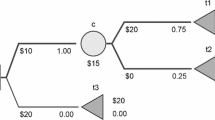Abstract
This paper is devoted to sequential decision problems with imprecise probabilities. We study the problem of determining an optimal strategy according to the Hurwicz criterion in decision trees. More precisely, we investigate this problem from the computational viewpoint. When the decision tree is separable (to be defined in the paper), we provide an operational approach to compute an optimal strategy, based on a bicriteria dynamic programming procedure. The results of numerical tests are presented. When the decision tree is non-separable, we prove the NP-hardness of the problem.
Preview
Unable to display preview. Download preview PDF.
Similar content being viewed by others
References
Bielza, C., Rios Insua, D., Rios-Insua, S.: Influence diagrams under partial information. In: Bayesian Statistics, Oxford, U.P, vol. 5, pp. 491–497 (1996)
de Campos, C.P., Kikuti, D., Cozman, F.G.: Partially ordered preferences in decision trees: computing strategies with imprecision in probabilities. In: IJCAI Workshop on Advances in Preference Handling (2005)
Howard, R., Matheson, J.: Influence Diagrams. Strategic Decisions Group, Menlo Park (1984)
Jaffray, J.-Y., Jeleva, M.: Information processing under imprecise risk with the hurwicz criterion. In: 5th International Symposium on Imprecise Probability: Theories and Applications, pp. 233–242 (2007)
Kasperski, A.: Discrete Optimization with Interval Data: Minmax Regret and Fuzzy Approach. Studies in Fuzziness and Soft Computing. Springer, Heidelberg (2008)
LaValle, I.H., Wapman, K.R.: Rolling back decision trees requires the independence axiom. Management Science 32(3), 382–385 (1986)
McClennen, E.F.: Rationality and Dynamic choice: Foundational Explorations. Cambridge University Press, Cambridge (1990)
Puterman, M.L.: Markov Decision Processes - Discrete Stochastic Dynamic Programming. Wiley & Sons, Chichester (1994)
Raiffa, H.: Decision Analysis: Introductory Lectures on Choices under Uncertainty. Addison-Wesley, Reading (1968)
Shachter, R.: Evaluating influence diagrams. Operations Research 34, 871–882 (1986)
von Neuman, J., Morgenstern, O.: Theory of games and economic behaviour. Princeton University Press, Princeton (1947)
Walley, P.: Statistical reasoning with imprecise probabilities. Monographs on statistics and applied probability, vol. 91. Chapman and Hall, Boca Raton (1991)
Weichselberger, K.: The theory of interval-probability as a unifying concept for uncertainty. In: 1st International Symposium on Imprecise Probabilities: Theories and Applications (ISIPTA), pp. 387–396 (1999)
Author information
Authors and Affiliations
Editor information
Editors and Affiliations
Rights and permissions
Copyright information
© 2009 Springer-Verlag Berlin Heidelberg
About this paper
Cite this paper
Jeantet, G., Spanjaard, O. (2009). Optimizing the Hurwicz Criterion in Decision Trees with Imprecise Probabilities. In: Rossi, F., Tsoukias, A. (eds) Algorithmic Decision Theory. ADT 2009. Lecture Notes in Computer Science(), vol 5783. Springer, Berlin, Heidelberg. https://doi.org/10.1007/978-3-642-04428-1_30
Download citation
DOI: https://doi.org/10.1007/978-3-642-04428-1_30
Publisher Name: Springer, Berlin, Heidelberg
Print ISBN: 978-3-642-04427-4
Online ISBN: 978-3-642-04428-1
eBook Packages: Computer ScienceComputer Science (R0)




